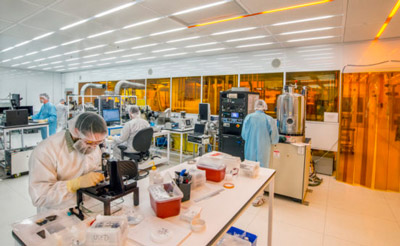
A series of DOE Office of Science awards, announced today, will enable accelerated development of quantum computing, which holds the promise of solving science problems that are far beyond the reach of today’s computers. The Molecular Foundry has received two awards from the Office of Basic Energy Sciences to develop research infrastructure to advance quantum information science.
In one project, Molecular Foundry scientists will create a “nanofabrication cluster toolset,” or an integrated suite of high-fidelity instruments that will allow users to investigate the fundamental limits of state-of-the-art quantum systems. The toolset will include a robotic fabrication system, a high-resolution electron beam writing system, and a low-temperature transport measurement system. Molecular Foundry users can purpose these tools to develop precision fabrication approaches that minimize sources of unwanted electrical, magnetic, and thermal “noise” in qubit circuits.
The second project will develop and integrate a unique suite of electron beam-based metrology techniques. The project combines spin-polarized low-energy electron microscopy (SPLEEM) with electron decoherence interferometry and cryogenic sample environments (down to temperatures of about 4 Kelvin). These tools will open powerful new research opportunities for Molecular Foundry users to explore electronic structures and spin textures in quantum materials, and solid-state structures relevant for quantum information science.

